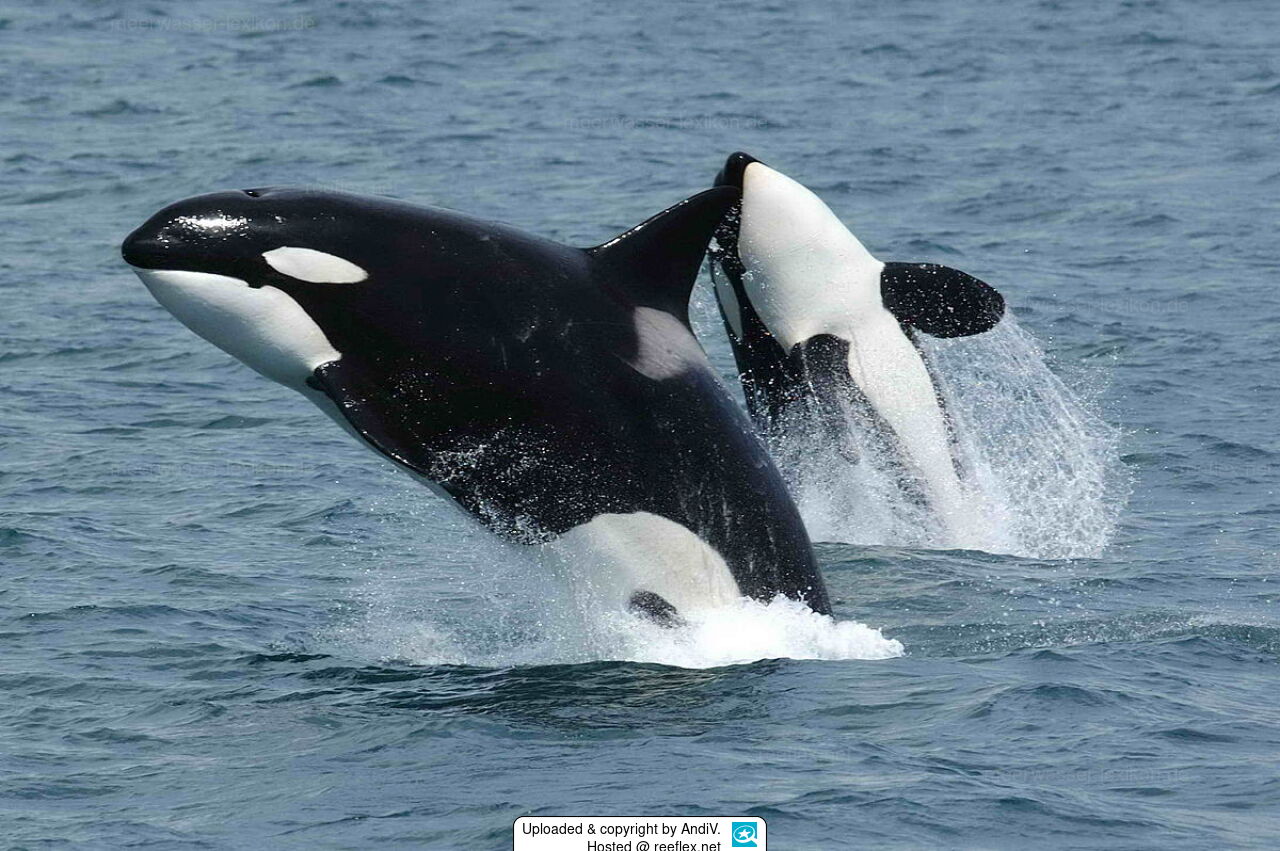Info
Orcinus orca is a species of cetacean from the dolphin family.
The killer whale occurs in almost all the world's oceans, sightings have occurred in Antarctica, the Azores, the Comoros, the European coasts, the Gulf of Maine, the Gulf of Mexico, the Gulf of St. Lawrence, Kenya, the Mediterranean Sea, Mozambique, New Zealand, the northern West Atlantic, the coast of Portugal,
Reunion Island, the coast of Somalia, the mouth of the St. Lawrence River, the coast of Tanzania and British Columbia.
Colloquially, this beautiful whale is also called a killer whale, a name it wrongly bears.
This whale kills only to preserve its own life and not, as it is often said, out of pure murderousness.
Its menu includes salmon, small sharks, whale calves, seals, sea lions, elephant seals, tuna, and, having no natural enemies other than man, they are among the apex predators of the seas.
Killer whales are intelligent, adaptable and very social animals that live in family groups with cows, calves and bulls.
Most remarkably, some killer whale families have learned to capture young and unwary sea lions right at the stand by having the whales catapult themselves onto the stand at great speed and grab their prey there.
The young whale calves learn this special tactic from their mothers and pass it on from generation to generation.
Through the movies "Free Willy " this whale became known to a wide audience.
Unfortunately, these elegant and powerful mammals are still kept and trained in large oceanariums and zoos.
Despite its peaceful and docile behavior, time and again whale trainers are killed in the training of these mammals.
That killer whales do not feel well in aquariums, despite the best medical care, can be seen in the hanging fin, the sword.
Animals in the wild always have a vertical sword, which can grow up to 180 cm long, and gave the whale its name.
Like dolphins, killer whales use a wide repertoire of sounds for communication and echolocation.
And, if you can't do without the beautiful black and white coloration, here's a great tip for you.
The daily Hamburger Abendblatt published a report on April 23, 2012 about a white Albi killer whale that was discovered in the North Pacific, see link.
Even one of the biggest predators of the seas, the great white shark, is on the menu of the orcas.
Recently (2022, 2023), the killer whales off the Iberian coast in the Strait of Gibraltar have been causing a stir, as the large mammals are increasingly attacking boats and causing them severe damage in some cases.
Exact reasons for this behavior are not yet known.
https://www.tagesschau.de/ausland/orca-angriffe-mallorca-100.html
Classification: Biota > Animalia (Kingdom) > Chordata (Phylum) > Vertebrata (Subphylum) > Gnathostomata (Superclass) > Tetrapoda (Superclass) > Mammalia (Class) > Theria (Subclass) > Cetartiodactyla (Order) > Cetancodonta (Suborder) > Cetacea (Infraorder) > Odontoceti (Superfamily) > Delphinidae (Family) > Orcinus (Genus)
The killer whale occurs in almost all the world's oceans, sightings have occurred in Antarctica, the Azores, the Comoros, the European coasts, the Gulf of Maine, the Gulf of Mexico, the Gulf of St. Lawrence, Kenya, the Mediterranean Sea, Mozambique, New Zealand, the northern West Atlantic, the coast of Portugal,
Reunion Island, the coast of Somalia, the mouth of the St. Lawrence River, the coast of Tanzania and British Columbia.
Colloquially, this beautiful whale is also called a killer whale, a name it wrongly bears.
This whale kills only to preserve its own life and not, as it is often said, out of pure murderousness.
Its menu includes salmon, small sharks, whale calves, seals, sea lions, elephant seals, tuna, and, having no natural enemies other than man, they are among the apex predators of the seas.
Killer whales are intelligent, adaptable and very social animals that live in family groups with cows, calves and bulls.
Most remarkably, some killer whale families have learned to capture young and unwary sea lions right at the stand by having the whales catapult themselves onto the stand at great speed and grab their prey there.
The young whale calves learn this special tactic from their mothers and pass it on from generation to generation.
Through the movies "Free Willy " this whale became known to a wide audience.
Unfortunately, these elegant and powerful mammals are still kept and trained in large oceanariums and zoos.
Despite its peaceful and docile behavior, time and again whale trainers are killed in the training of these mammals.
That killer whales do not feel well in aquariums, despite the best medical care, can be seen in the hanging fin, the sword.
Animals in the wild always have a vertical sword, which can grow up to 180 cm long, and gave the whale its name.
Like dolphins, killer whales use a wide repertoire of sounds for communication and echolocation.
And, if you can't do without the beautiful black and white coloration, here's a great tip for you.
The daily Hamburger Abendblatt published a report on April 23, 2012 about a white Albi killer whale that was discovered in the North Pacific, see link.
Even one of the biggest predators of the seas, the great white shark, is on the menu of the orcas.
Recently (2022, 2023), the killer whales off the Iberian coast in the Strait of Gibraltar have been causing a stir, as the large mammals are increasingly attacking boats and causing them severe damage in some cases.
Exact reasons for this behavior are not yet known.
https://www.tagesschau.de/ausland/orca-angriffe-mallorca-100.html
Classification: Biota > Animalia (Kingdom) > Chordata (Phylum) > Vertebrata (Subphylum) > Gnathostomata (Superclass) > Tetrapoda (Superclass) > Mammalia (Class) > Theria (Subclass) > Cetartiodactyla (Order) > Cetancodonta (Suborder) > Cetacea (Infraorder) > Odontoceti (Superfamily) > Delphinidae (Family) > Orcinus (Genus)







 AndiV
AndiV



